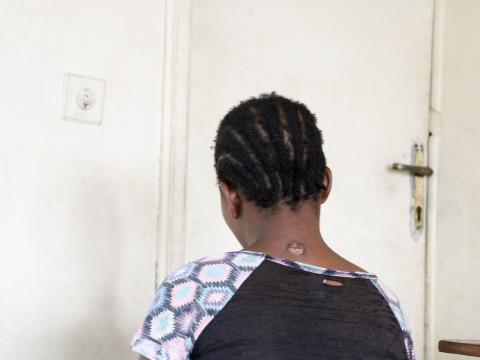Growing up too fast | Life in the militias of Kasai, DRC

“My uncle joined the militia on a Monday, and I joined on the Thursday. It was my own choice.”
At least three of Kapinga's cousins had been killed in the violence that was destabilizing Kasai province, as a customary conflict in Kasai Central last August quickly inflamed ethnic and political tensions throughout all five provinces of the Grand Kasais.
“My paternal uncle was the baby of his family. If he hadn’t joined the militia, he would have taken the state exam last year, to graduate from high school.”
“But as he was on his way back from a battle in Tshikapa, he was on a motorcycle, and the armed men followed and shot him. He disappeared, no one’s seen him since.”
“There was nothing good, nothing to like in the militia.” Kapinga said clearly. “I spent a month and a half in the militia. People gave money to our leaders at road blocks, but our leaders didn’t give us anything since they were older.”
“In the militia, there was a group of people who liked the movement, and a group who didn’t. But no one ever quit the militia. We all went to battle. It hurt to see people die.”
Kapinga and the other children in the militias were given sticks as weapons. In battle, Kapinga’s job was to gather spent munitions on the ground into her skirt, and then fling them at the armed men.
“When our skirts were full, we threw the munitions at the armed men and they’d fall,” Kapinga told me.
Kapinga and the others were also given red bands to wear around their waists, and told that when they were tired in battle, all they had to do was tug on them “to disappear and go anywhere else.” Other children told me similar stories about bending down to brush blades of grass to teleport to their staging camp from the battle.
After the death of her uncle, Kapinga made the decision to quit the militia once and for all. But before she could do so, she went to yet another battle where she was shot through the neck. The ball passed straight through the left side of her neck, miraculously leaving Kapinga alive.
“I don’t feel anything after everything that’s happened. I was shot when we went to battle, and they brought me to the medical center. When they shot me I fell on the ground.”
From the medical centre, Kapinga was brought to the military camp outside Kananga for further treatment, and from there to a centre for demobilized children. Out of the dozens of girls who were once staying here, there’s now only four left. Most have now rejoined their families and are receiving help to get back into school and reintegrate with their communities.
Kapinga’s hopes for the future are simple. “I’d like to go home to my father. When I’m back I want to restart my selling activities.”
It’s sad, but I feel as if Kapinga’s childhood left her long ago, maybe when her Mum died and she dropped out of school to begin earning for her siblings. Her month and a half in the militia has only confirmed it. I was surprised Kapinga didn’t seem to have any interest in school, but after leaving it behind so long ago, I suppose going back to a life of selling in the market seems comforting – and infinitely easier and more peaceful than her recent experiences.